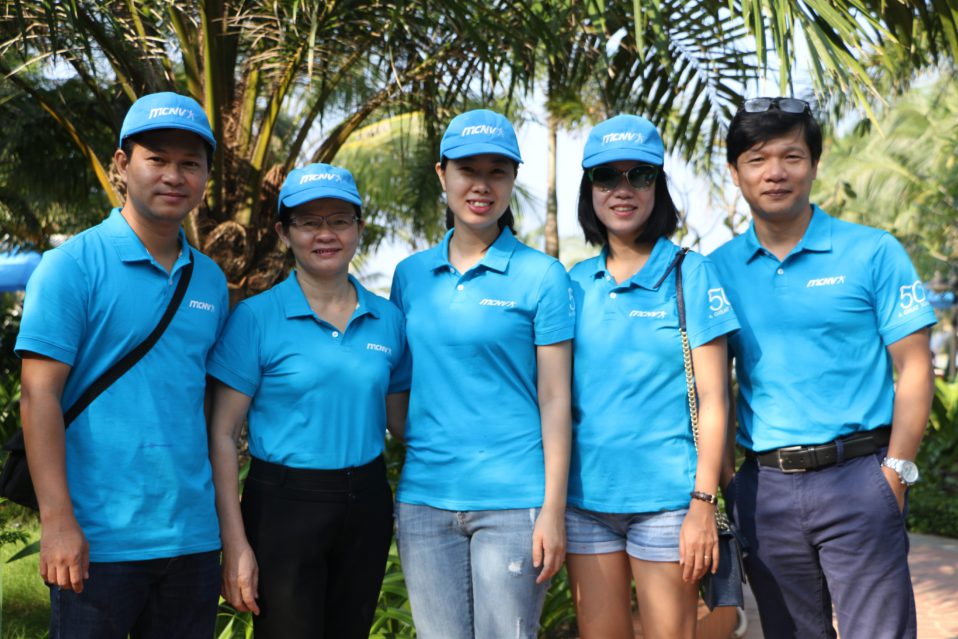On November 4th MCNV and AFAS Foundation signed a collaboration contract in Amsterdam. A contract on rural development and food security in the coming years in Laos.
MCNV participated in International Conference on Public Health
From November 5th – 6th, MCNV participated in the 8th International Conference on Public Health Among Greater Mekong Sub-Regional Countries,
MCNV Supports the 10th National Health Research Forum in Lao PDR
MCNV was delighted to support the 10th National Health Forum held in Savannakhet province, Lao PDR, as part of the EU funded LEARN program.
a.s.r – Dutch insurance company to pilot a “Community Income Protection Insurance” for poor women in Ben Tre province
Climate change and saline intrusion in the Mekong Delta, Vietnam has caused negative impacts for millions of inhabitants who live in coastal areas. Poor families who live on fisheries and agricultural production have suffered from income loss due to less yield crops and worsening health conditions.
Towards improvement in inclusive education for children with disability
On December 12th 2016, the Department of Education and Training (DoET) of Quang Tri Province, MCNV and the Korean INGO Medipeace co-organized a workshop to share results of an assessment on inclusive education (IE) for children with disabilities (CWD) recently done in the province. Participating in the workshop were representatives of provincial- and district-level organisations of the education sector, labour, invalids and social affairs sector, health sector and finance sector, the Disabled People’s Association, the Village Health Workers’ Association, the Charity Association and some INGOs. Besides sharing the IE assessment results, the DoET of Quang Tri Province, MCNV and Medipeace also consulted the relevant parties about the proposed plan on IE development in Quang Tri in the period of 2017-2020.
Earlier in October and November 2016, MCNV provided technical support to and collaborated with the DoET of Quang Tri to do a survey in Cam Lo, Gio Linh and Huong Hoa districts and Dong Ha city to assess the current situation of IE. The assessment results would be used for the orientation of interventions in improving the IE work in Quang Tri. Statistics show that Quang Tri province has about 37,000 people with disabilities, in which there are more than 6,300 CWD, counted for 1.1% of the population. Key findings from the assessment unveil that the education sector and other relevant sectors currently face a lot of challenges in the IE for CWD, particularly in implementing the supporting policy, ensuring financial sustainability, multi-sectoral collaboration, building capacity for teachers and parents of CWD, and improving the participation of CWD at schools. Key solutions identified and agreed upon at the workshop include: (i) setting up and developing a sustainable system of technical assistance and provision of early intervention and education services for CWD; (ii) transforming the current special education school into a support centre for IE; and (iii) strengthening human resources and capacity for the relevant organisations.
MCNV launched “Learning from the use of Innovative Communication Methods” project in Lao PDR
From 20th to 24th of March 2017, MCNV Laos organised a traning of trainers followed with a formulation workshop in Vientiane Capital to officially launch the project “Learning from the use of Innovative Communication Methods” (LICM). Participants to the event were 18 key persons from three project partners – Lao Disabled People’s Association (LDPA), Vientiane Youth Centre for Health and Development (VYCHD), and Proud To Be Us (PTBU), an informal network of LGBTI people in Lao PDR. Also attending the event were representatives of the National Institute of Public Health, University of Health Sciences, UNFPA and OXFAM Laos.
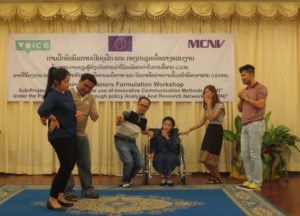
LICM is an action research project that aims to enable local partners to learn about the potential of creative methods in improving sexual and reproductive health and rights (SRHR) of vulnerable youth groups and as a tool to study specific SRHR challenges these groups face. Young girls working in garment factories, LGBTI people and disabled youth are the project’s target groups. The project also investigates if and how the use of innovative communication methods can enhance dialogue on SRHR issues between communities, vulnerable youth and policy makers.
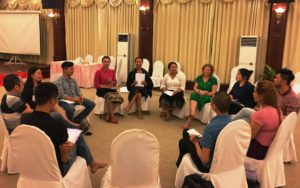
The training of trainers has provided participants with basic techniques and insights about some forms of creative communication such as theatre, shadow drama and participatory video for peer learning, behavior change and advocacy in relation to SRHR issues. With more technical support from MCNV, the project partners (LDPA, PTBU and VYCHD) will formulate co-creative teams, develop creative communication products with different methods, organise communication events and involve policy makers in dialogue on SRHR issues.
Embracing Practices of Inclusion
A new publication by MCNV, Global Initiative on Psychiatry, and World Granny is available:
Download Embracing Practices of Inclusion
Stories of how people in Georgia, Lao PDR, Sri Lanka, Tajikistan and Vietnam made inclusive development happen in their societies.
MCNV and a.s.r. win Partnership Award 2016
On Thursday afternoon, May 12th, in the Hague, the Best New Partnership Award 2016 is awarded to the team of MCNV and a.s.r., for the best social project in a developing country.
Biogas in the memory of a donor
Tom Fluitsma is an MCNV donor and has been an active volunteer from 1999 onwards, as an editor of MCNV Magazine and as a tour leader of donor travels. He has often traveled in Vietnam, with and without donors. This year he writes columns about special memories of the times he was there.
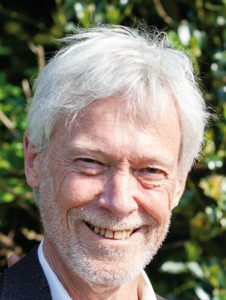
Mr. Tom Fluitsma, MCNV’s donor
Biogas
November 1999. My first visit to Vietnam. Of course, we also visit the Mekong Delta for a few days. Our travel guide takes us to tourist sights. Sometimes he adds a small surprise to our program. For example, we visit a small farming village in the delta. We walk into the yard of a family and are warmly welcomed in their wooden house. There are a few large pigs in a pen next to the house. We exchange some courtesies and the guide translates: ‘You are welcome in our house. Take some of the fruit on the table’, ‘Thank you so much, kind of you to receive us’. In the meantime, I can’t keep my eyes off a giant plastic bag hanging under the roof of the house.
Pigs. In the Netherlands we like pork chops or bacon. We keep a lot of pigs for that, about 12.5 million. The manure of all these pigs is useful in agriculture, but it also produces a lot of greenhouse gases. We can hardly use that with global warming going on. No surprise, therefore, that this topic gets attention in the draft climate agreement. One of the many documents associated with this agreement contains the following proposal: ‘Processing and valorization of all fresh pig manure in closed regional clusters into green energy, substitutes for fossil fertilizer and valuable fertilizers’.
Biogas. In Vietnam there are 4 million pig farmers. There are differences between Vietnam and the Netherlands, but one thing is the same: Vietnamese pigs also produce manure and that manure also produces a lot of greenhouse gases. In November 2018, an interesting article was published in our NRC newspaper about a study into the extent to which countries succeed in offering their population a good standard of living, without exceeding ecological limits. Vietnam does relatively well in that study. Nice detail: almost 10% of pig farmers have a biogas installation. The article reminds me of my visit to Vietnam in 1999.
Back to the Mekong Delta, November 1999. I’m still looking at that giant plastic bag hanging under the roof. Our guide notices. That was exactly his intention, he didn’t take us to this family for nothing. He no longer leaves me in suspense: “This farmer has a few pigs. He collects the manure in the sealed container that you see there. He leads the biogases that are released upwards into the big bag in that thick plastic hose. At the back of the bag a black tube goes to the gas burner in the kitchen. This is how this family cooks, on free gas’. A special place of interest, off the beaten tourist paths. That was in 1999. Now, twenty years later, there are 350.000 pig farmers in Vietnam with an installation like that. As far as I know, Vietnam does not have a climate agreement, but the pig farmers there are well on their way to ‘processing and upgrading all fresh pig manure in closed region clusters into green energy’.
“We now think differently about disabled people”
Ngoc Lan, staff member of MCNV for 20 years
“We now think differently about disabled people”
As soon as we meet each other in the lobby of the hotel in Dong Ha, Nguyen Ngoc Lan spreads her arms and walks towards me with a smile. A cordial and inviting gesture that, according to all of MCNV colleagues, is characteristic of Ngoc Lan. She is a doctor, worked as a project manager at MCNV in Quang Tri for almost 20 years and left the organization at the end of 2018. While enjoying a cool glass of fruit juice I ask her to look back on the many projects in which she participated. Does she see improvements in the lives of the people she has supported?
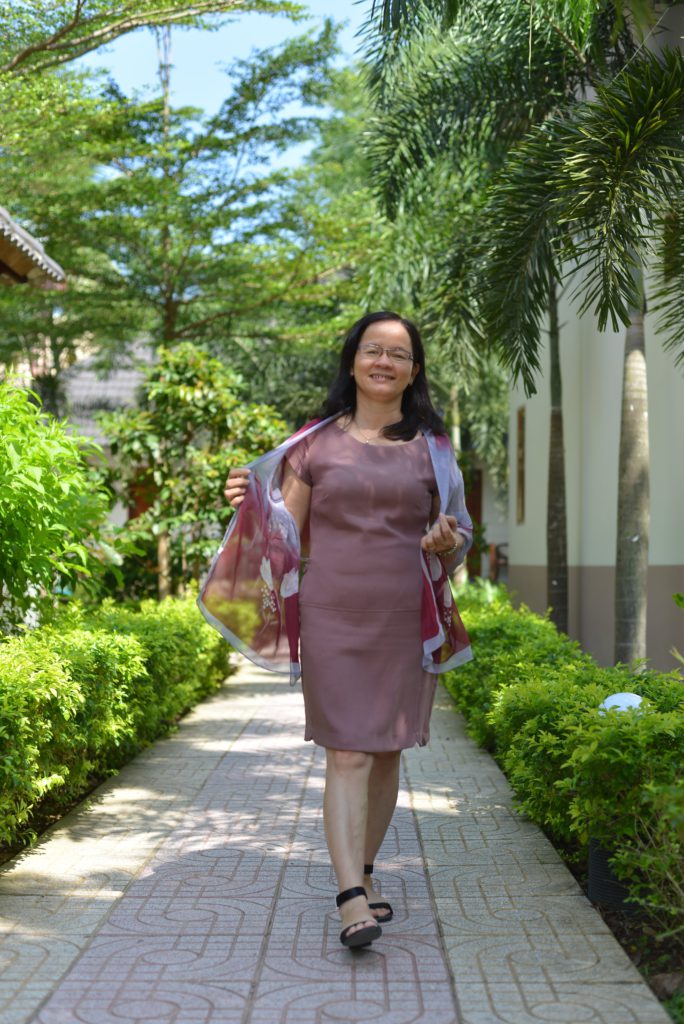
Ms. Ngoc Lan, staff member of MCNV for 20 years
Compared to the past I certainly see improvements in the lives of the disabled,” says Ngoc Lan. “Soon after I started at MCNV in 1999, I went to see a poor family with four disabled children. Try to imagine that, four seriously ill children in one family, who received no help or support whatsoever. Imagine the struggle of the parents to improve the situation. After the World Health Organization (WHO) issued a guideline on the inclusion of disabled people, MCNV, together with partners, devised a comprehensive approach to tackle the problems of disabled people. Good results have emerged from this.
” Having a disability, getting married was once unthinkable”
People with disabilities were dicriminated in the past, but when they stood up and started working, they got respect from the people around them. For the first time their lives moved upwards instead of spiraling downwards. People with disabilities who are getting married, for example, this was previously unthinkable in Vietnam. Most disabled people can now develop better physically because they can use guidance and physiotherapy at a young age. They have more self-confidence and can participate better, they learn that in the organization for the disabled. But that did not happen overnight. It takes a lot of time, we have been busy improving the living conditions of the disabled for 20 years. And we could only achieve that together with our very valuable partners and donors. The motto of the disability organization is: we learn, adapt and change. We learn, adapt and change, that also applies to MCNV.
“I am proud of what MCNV has done and I believe that much more can still be achieved, together with partners and donors.”
Already ten years later much more support was available for people with physical disabilities. But there was nothing at all for people with epilepsy or schizophrenia, for example. They were given some form of medication and nothing else. The medical staff was not trained to help these people in their daily activities or to improve their lives. Thanks to subsidies from the TEA (Transition in the East Alliance) program, from 2011 onwards, MCNV could implement a number of Mental Health projects. The changes we saw there were not so many in quantity, but essential in the quality of the lives of these people. Their family members were taught more about the illness of their loved ones and how to deal with their problems. We also trained the medical staff to better tailor the medication to suit the patient and the disease. There has been lot of progress, at relatively little cost, and MCNV can be proud of that.”
Support for school project
Ngoc Lan: “Another important project is waiting for support from MCNV. Two years ago a study showed that high school students suffer from depression, behavioral disorders and stress. More than 20% of 12- to 20-year old students have trouble in their lives. The rise of social media in Vietnam plays a role in that, because young people experience pressure to always deliver and be popular. Teachers can see these problems, but generally do not know how to support their students and, in serious cases, guide them towards professional caregivers. MCNV made a training plan for this, but we’re now waiting to implement it because unfortunately there is no money available. I hope that in the near future there will be money made available for this project still.”
By Saskia Stevens



